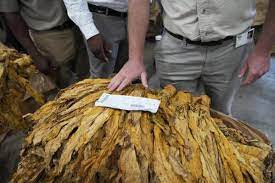
Tobacco remains Zimbabwe’s largest agricultural export, generating a record US$1,3 billion from 236 million kg sold in 2024. Sales for 2025 are already up 49,9% year on year, with 334,8 million kg sold by July 7, earning the economy an estimated US$1,12 billion.
Yet, beneath these impressive numbers lies a deeper concern, which requires urgent attention.
It is estimated that a staggering 98% of Zimbabwe's tobacco is exported in raw form. This practice hands most profits to foreign manufacturers, while Zimbabwe settles for crumbs — losing out on jobs, revenue and industrial development.
Globally, the processed tobacco market is worth an estimated US$15 billion, illustrating the stark contrast between what big capital earns and what remains in this market.
To unlock the sector’s true potential, Zimbabwe must pivot decisively towards value addition. While there are encouraging developments — such as Cavendish Lloyd’s recent licensing to produce Shisha tobacco and Cut Rag Processors’ US$100 million manufacturing plant in Harare — these efforts are not enough.
Zimbabwe must scale up processing capacity and protect local interests from foreign dominance. In the absence of this, tobacco may end up as another resource curse.
Currently, 95% of the tobacco crop is purchased by foreign merchants, who dictate terms and extract the bulk of the value chain. This dynamic worsens with policies such as the Reserve Bank of Zimbabwe’s February decision to reduce the forex retention threshold from 75% to 70%.
Farmers now receive 30% of their earnings in Zimbabwe Gold (ZiG) — a volatile currency — while nearly all production costs are pegged in US dollars. This is a recipe for disaster.
- Minister bemoans shortage of schools
- BCC joins Green Cities initiative
- Mlalazi chronicles his rags-to-riches story
- Mlalazi returns to roots with a free concert
Keep Reading
The Zimbabwe Tobacco Association has warned this policy is unsustainable.
“Your US dollar production costs range from 85% to 100%, yet you will only be retaining 70%,” the ZTA cautioned in March. “Your 30% (paid) in local currency will be insufficient to help recover production costs and keep you viable in the coming seasons.”
That warning was not just another statement by a sector resisting monetary policy. It requires action. Zimbabwe’s Tobacco Value Chain Transformation Plan aims to grow the industry into a US$5 billion powerhouse by 2030, driven by local processing, investment, and modern infrastructure. But without urgent reforms — fair pricing, realistic forex policies, and reduced foreign control — this goal will remain a pipe dream.
Yet the more Zimbabwe procrastinates, the more it relegates farmers to poverty. Zimbabwe cannot afford to remain a raw commodity exporter while others reap the rewards.
Protecting this vital sector requires bold, urgent action — from aggressive value addition to empowering local processors and ensuring fair earnings for farmers. Many more actions will be vital on this front.
The clock is ticking.






